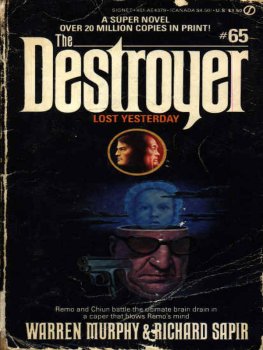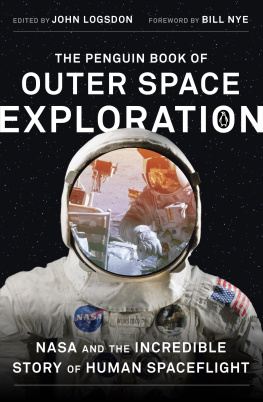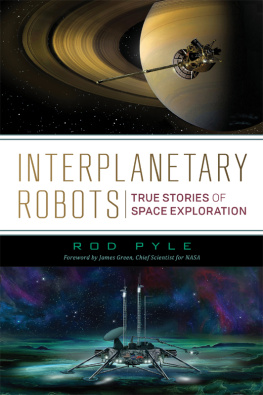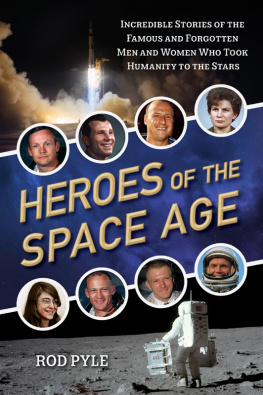Destroyer 125: The Wrong Stuff
By Warren Murphy and Richard Sapir
Chapter 1
Life Discovered on Mars!
That blaring headline, seen all around the world, had been one of Clark Beemer's. To this day it remained the public-relations man's personal favorite.
The "meteorite" in which the fossilized bacteria had been discovered was a chunk of ordinary concrete Clark had found at a building demolition site on his way into work at NASA's Jet Propulsion Laboratory in California. Buffed, shellacked and dusted with an appropriate amount of space-age glitter from a local party-supply store, the rock had looked great for newspapers, networks and magazines. And, most importantly of all, it had gotten the tightwads in Washington to cough up an extra nine hundred million bucks for the United States space agency. Not bad for a piece of rock salvaged from the ruins of an old Piggly-Wiggly.
When the truth was learned-that the only thing trapped in the stone was some Pepsi-Cola from an ancient spill in aisle 7-it no longer mattered. The media machine had long moved on to the next story. NASA quietly pocketed the budget windfall generated by the publicity, Clark Beemer accepted approval from the brass and the PR man moved on to the next project.
Those were heady days. As he thought of that great life-on-Mars scam, Clark couldn't help but wax nostalgic.
Back then his job had been a joy. Twenty bucks worth of supplies with a record-breaking payday. But that was a once-in-a-lifetime score. This time out, Clark wasn't sure he or NASA would be able to capture the public's imagination.
Clark's fleeting nostalgic smile evaporated as he looked at the thing he was supposed to sell. It was a PR nightmare. The image was blurry on the computer monitor.
"What the hell did you make it look like that for?" Clark groused. Sweat beaded on his broad forehead. The heat in the mobile control room was oppressive.
The man before him wore a tense expression. His youthful face was dotted with a scruffy beard. "The extra legs are for balance and coordination," Pete Graham replied, annoyed. "And the redundancy's necessary for hostile climates. If there's a malfunction in one, others take up the slack." Graham was hunched over a control board. The computer terminal buried in the board's face tracked the movements of a bulky silver object as it walked through what looked like a shimmering cave.
The mechanical device moved awkwardly on its eight slender metal legs. When its third right leg stumbled, the surrounding legs supported the object's weight.
The scientists in the room watched the display with guarded enthusiasm. Clark Beemer alone wore a deep frown.
Walking, the machine looked like a baby taking its first uncertain steps. But, unlike a baby, there was no one in his or her right mind who would want to cuddle up to it.
"A spider," Clark growled softly as he studied the fuzzy outline of the device on the screen. His knuckles rested on the console next to Pete Graham's workstation.
"Perfect design for Virgil," Graham said.
"Right," Clark said with thin sarcasm. "I guess a cockroach or a snake would have been too perfect. And what's with that name anyway?"
Graham flexed his fingers over his keyboard. "Virgil was Dante's guide through Hell," he explained absently.
"Who?" Clark asked. When no one answered, the PR man shook his head. "How am I going to sell this thing?" he exhaled, dropping back into a swivel chair. He wiped the sweat from his face with his loose shirttail.
For the past three days Clark had been reminding the scientists that it was his salesmanship that mattered more than this latest Erector Set reject of theirs.
On the flight down from Florida to Mexico and on the chopper ride from the airport to this remote trailer in the shadow of Popocatepetl southeast of Mexico City, Clark Beemer had made his importance abundantly clear. So loud and frequent had been his words on the subject that most everyone had tuned him out by this point.
Clark watched the scientists busy themselves for a long moment. They seemed so focused, so excited. A bunch of geeks playing games. None of them understood how this game was really played now.
"You know," he said, exhaling loudly once more, "this is just like those boring whatchamacallit things they did at NASA back in the sixties. The ones where they put those guys on roman candles and shot them into the sky. But not the sky sky. The dark stuff that's above the sky. Bo-ring." He made a few snoring noises. "Damned if I know how the old Canaveral guys drummed up any interest in that."
Engrossed in his work, Graham didn't bother to explain about the thrill of exploration that had driven everyone at NASA back in those heady days when all of space was new. Not that he had been around to see it. Pete Graham wasn't even born when man first walked on the moon.
His eyes sharp, Graham studied the movements of the probe he had built.
Popocatepetl was in one of its less active phases. Good thing, too. Virgil couldn't have survived inside an erupting volcano. But a completely dormant volcano was useless for their purposes. What they needed was a volcano with a recent active history that was in a down phase. With its constant threats of eruption, "Popo," as the Mexican volcano was commonly known, fit the bill perfectly.
A helicopter had lifted Virgil to the mouth of the volcano an hour ago. A thick cable from its belly had lowered the spiderlike device into the crater where ash and glowing red rocks lined the dark throat like a disease.
The trailer in which Pete Graham and his team monitored the progress of the probe was propped on rocks near a lava-and-mud-filled gorge beneath a freshly blown out parasitic cone. It was there they held their breath as they watched the probe being lowered into place.
A million worries flooded Pete Graham's brain. Was the cable strong enough? Would it snap under stress? Could the helicopter negotiate the powerful updrafts? A single gust of wind buffeting the helicopter far above, and the gleaming probe would be dashed against the rocks and lost forever.
Then there was the awful possibility that his baby might malfunction. During the deployment phase, he tried to keep this last, horrible notion as far from conscious thought as was humanly possible.
When the Virgil probe was settled to the rock floor of the crater, anxiety rang in Graham's ears. There was a single, horrifying moment after the cable was released when it looked as if Virgil might tip over. But to the scientist's relief, the probe caught itself. A jerky manipulation of one leg, and the giant mechanical spider oriented itself on the floor of the cavern. When the applause erupted in the trailer, Clark Beemer didn't join in. After ten minutes of seeing that thing crawling around in Popocatepetl, the PR man was checking his watch, bored.
The scientists instructed the probe to plant two stationary cameras on the floor of the cave to monitor its movements. Another head-mounted microcamera gave a bird's-eye view of Virgil's progress.
As it crawled around in semidarkness in the steaming cavern, the men in the trailer studied its every move. Clark Beemer couldn't believe how excited they all were.
"What is it for anyway?" Clark muttered as the scientific team studied the data coming in from Virgil. Pete Graham didn't lift his eyes from his computer screen. "Virgil is a planetary probe designed to exist in hostile environments. If it can endure the heat of a volcano, it can do the same thing on an alien world."
"Don't you have heat simulators at NASA?"
"Nothing like this," Graham explained. "And a natural environment, not an artificial one, is what Virgil will be facing. We need to test him under battlefield conditions."
The lava beds that the probe walked past were flaming orange. The black walls seemed to pulse with spectral energy. A sweep from a side-mounted light illuminated the nearby smoking wall in garish white. Virgil moved jerkily and the wall slipped away.
Next page








